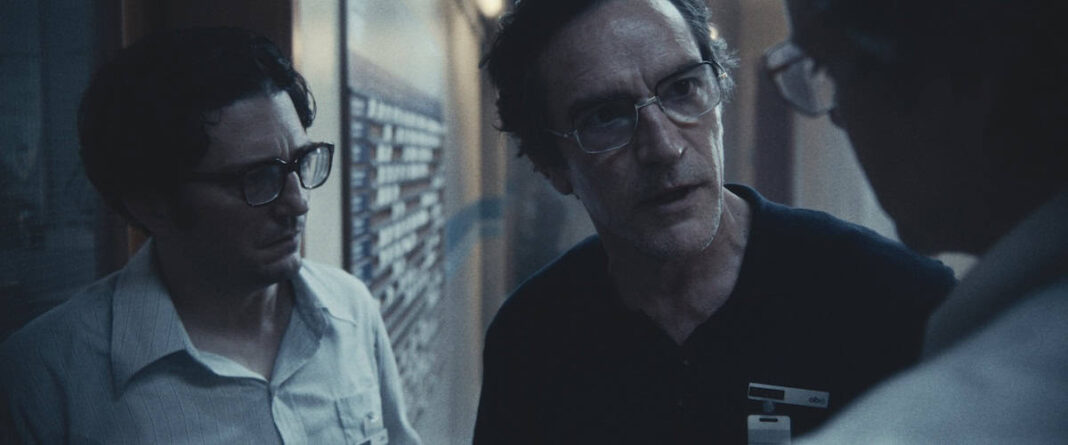September 5 is a gripping portrayal of the Munich Massacre, offering a unique perspective on how ABC Sports reported a tragedy that shook the world.
The Story So Far
Set against the backdrop of the 1972 Munich Olympics, September 5 dives into the chaos and horror faced by the ABC Sports team as they cover the unfolding events of the Munich Massacre in real-time. The film captures the adrenaline-fueled atmosphere of a newsroom under unprecedented pressure, where journalists find themselves navigating a rapidly evolving crisis that would leave a lasting impact on global history.
An In-Depth Review
A Unique Perspective
While many films, including Spielberg’s Munich, have depicted the events surrounding the Munich Massacre, September 5 sets itself apart by placing viewers directly in the shoes of the reporters charged with conveying the news. The film focuses on a team of overworked and sleep-deprived journalists who had arrived in Germany to cover the Olympics, only to find themselves in the midst of a historical tragedy. As they scramble to report on the events, they grapple with the weight of their responsibility, knowing that their coverage could influence public perception and response.
Capturing the Journalism Experience
The film resonates deeply with anyone familiar with the pressures of live news reporting. As a former radio operator, I found myself reflecting on the adrenaline rush that accompanies breaking news. September 5 captures this essence impeccably, illustrating the frantic pace and often chaotic decision-making process involved in delivering news under duress. The film’s protagonist, Geoffrey Mason—portrayed by John Magaro—embodies this experience, stepping into a role that quickly evolves from sports coverage to chronicling a pivotal moment in history.
Performance Highlights
The ensemble cast delivers stellar performances that enhance the film’s authenticity. Peter Sarsgaard shines as Roone Arledge, the head of sports, who must balance the demands of news coverage with the integrity of his team’s reporting. Viewers are introduced to a young Peter Jennings, played by Benjamin Walker, and a cast of talented actors who bring depth to their roles. Leonie Benesch stands out as the team’s German translator, navigating the language barrier as the situation escalates. Ben Chaplin’s Marvin Bader adds a layer of complexity by managing the tension between the journalists and the unfolding crisis, showcasing the delicate balance of information dissemination.
Directorial Brilliance
Under the direction of Tim Fehlbaum, September 5 transforms into a powerful historical document devoid of sensationalism. The sparse soundtrack complements the film’s urgent tone, while the tight editing and pacing mimic the frenzied atmosphere of the newsroom. The choice to confine the action to the studio allows viewers to focus on the emotional weight carried by the journalists, creating a visceral connection to the unfolding tragedy without resorting to dramatization.
An Unforgettable Experience
Running just ninety minutes, the film’s editing keeps the momentum alive, ensuring that viewers remain engaged from start to finish. The lack of a singular standout performance among the ensemble, while commendable, may hinder the film’s recognition during awards season. However, its craftsmanship and storytelling merit a place among cinematic classics like All the President’s Men and Broadcast News, both of which explore the intricacies of journalism.
Conclusion
In summary, September 5 is more than just a film about the Munich Massacre; it is a poignant exploration of the responsibilities and moral dilemmas faced by journalists during a crisis. By providing an intimate look at the chaos of live reporting, it serves as a reminder of the power of the media and the consequences of their coverage. This film deserves attention for its craftsmanship and its contribution to the conversation surrounding journalism’s role in a rapidly changing world.
Frequently Asked Questions
1. What is September 5 about?
The film chronicles how the ABC Sports team covered the Munich Massacre during the 1972 Olympics, highlighting the pressures of live journalism.
2. Who directed September 5?
The film was directed by Tim Fehlbaum.
3. What makes this film different from other movies about the Munich Massacre?
September 5 focuses on real-time coverage and the experiences of journalists rather than the events themselves.
4. Who stars in September 5?
The film features John Magaro, Peter Sarsgaard, Benjamin Walker, and Leonie Benesch, among others.
5. Is September 5 based on true events?
Yes, it is based on the real-life events surrounding the Munich Massacre and how they were reported.
6. What themes are explored in September 5?
The film explores themes of responsibility, the ethics of journalism, and the impact of live reporting during crises.
7. How long is September 5?
The movie runs for a taut ninety minutes.
8. Is there a soundtrack for September 5?
The soundtrack is minimal, enhancing the film’s tension and focus on the newsroom environment.
9. What is the critical reception of September 5?
The film has received positive reviews for its portrayal of journalism and its historical significance.
10. Where can I watch September 5?
September 5 opens in wide release on Friday. Check local listings for availability.
For more insights and reviews on films like September 5, visit CineRecap.com.
Tags: Munich Massacre, ABC Sports, September 5, Tim Fehlbaum, journalism films, historical drama, film review, movie release

